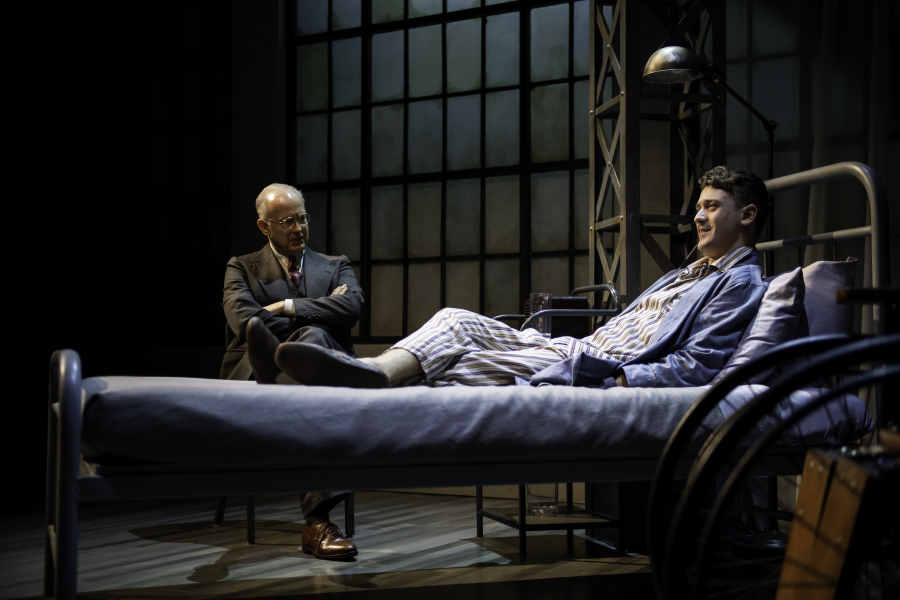Profoundly Moving CHESTER BAILEY at Contemporary American Theater Festival
Theater Reviews Page | Previous Theater Review | Next Theater Review
Profoundly Moving CHESTER BAILEY at Contemporary American Theater Festival

Posted on BroadwayWorld.com July 11, 2019
Structurally, plays don’t come much simpler than Joseph Dougherty‘s Chester Bailey, now in what appears to be its second production, at the Contemporary American Theater Festival in Shepherdstown (the first having been in 2016 at the American Conservatory Theater in San Francisco). The play consists mostly of two monologues delivered in alternating segments. There are a few interpolations where the characters address each other and at one point get into a physical tussle, but that’s all. And that’s all that’s necessary; the two intertwined stories don’t require much more dramatization than that.
One is the tale of the eponymous Chester Bailey (Ephraim Birney), a Brooklyn Naval Yard worker 23 years old in November 1944, at the time of the incident that profoundly injures him and sets up the action. The other is the tale of Dr. Philip Cotton (Reed Birney), Chester’s treating physician, charged with reconciling Chester to a life without eyes or hands. (As the reader will have guessed, the two Birneys are related, Reed being Ephraim’s father – and for that matter the husband and the father of actresses as well.)
Dougherty unspools these two stories with novelistic skill. The feeling of truly being in the period never lifts; one senses that Dougherty has done enormous research – much as Jennifer Egan did for her recent World War II Brooklyn Naval Yard-related tale Manhattan Beach, and detailed in the Acknowledgments to that book. Nor does the set by Luciana Stecconi hurt; in addition to there being convincing-looking accoutrements of a period hospital room, the vertical components of the set are girders that greatly resemble the airy trelliswork above the main concourse in the old McKim, Mead & White Pennsylvania Station, where parts of the action (in Chester’s recollection and his fantasy) occur. The windows at the rear also seem to be a reference to that concourse. More importantly, the stories reel us in: Chester’s of the way he deals with his injury, and Cotton’s of hospital life in wartime, with its politics, scandals, and sexual misbehavior.
Not to give too much away, despite the enormous differences, both Chester and Cotton enter and exit the story fundamentally alone. It seems, from what we hear of Chester’s life before his injury, that in that period he had his family and little else. Sent from his home on Long Island to enjoy a day on the town in Manhattan, for instance, he engages with no one except quite briefly with a magazine seller at the Pennsylvania Station newsstand. And shortly thereafter, he is effectively cut off from humanity by the destruction of his eyes and hands. Even his interactions with Cotton are at a distance because he has coped with his losses by refusing to acknowledge them, even to himself, which requires him in turn to refuse to occupy the same reality as Cotton. Chester even puts his own idiosyncratic spin on abuse he suffers in the hospital (not at Cotton’s hands). And while, both for plot reasons and out of empathy, Cotton finds himself at the end giving up his resistance to Chester’s allegiance to his own reality, Cotton cannot go there himself. Nor, divorced from his wife and involved in what seems like an insubstantial affair that cannot lead anywhere, can Cotton be otherwise than on his own.
And yet, despite this sadness and solitude, I suspect most members of the audience will file out asking themselves the same question I did: Is this a tragedy or not? And I suspect most of them, like me, will end up saying the question cannot be answered. En route to that conclusion, one will be greatly moved and saddened, as one would be at a tragedy; yet somehow the pieces taken together do not quite construct a tragedy. Each member of the audience will have to reach his or her own decision on this issue.
The unusual casting of this two-hander makes it a stunt of a sort, but the result entirely justifies it. Each Birney is a pro, and one quickly forgets the real-life relationship between them. Ephraim’s working-class New York accent and boyish charm seem to have nothing to do with the reserved, WASPy-sounding professional tones Reed endows Cotton with. The characters seem exactly like the natives of separate worlds Doughterty’s script calls for. As is usually the case, it is hard to disentangle the contributions of the director, here Ron Lagomarsino, from those of the performers, but the overall show manifests a limpid clarity for which Lagomarsino doubtless deserves considerable credit.
This show is the whole package: a polished, intriguing, thematically-consistent but otherwise dissimilar pair of stories well-told, leaving one profoundly moved. And, oh yes, the period music (including the inimitable Jo Stafford) is a perfect wrapping for the package.
Not to be missed.
Copyright (c) Jack L. B. Gohn, except for production photo.
Photo credit: Seth Freeman
Theater Reviews Page | Previous Theater Review | Next Theater Review